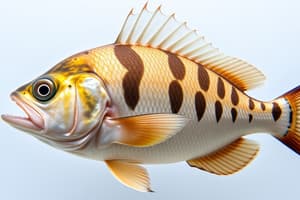Podcast
Questions and Answers
What enables schools of fish to swim in unison?
What enables schools of fish to swim in unison?
- Independently swimming patterns
- Complex verbal communication
- Simple rules and sensory cues (correct)
- Random movements
What role do evolutionary pressures play in the behavior of fish schools?
What role do evolutionary pressures play in the behavior of fish schools?
- They hinder fish from schooling
- They reduce energy efficiency
- They enhance group cohesion and survival (correct)
- They increase competition among fish
What are the two fundamental types of cells in the nervous system?
What are the two fundamental types of cells in the nervous system?
- Muscle cells and epithelial cells
- Neurons and glia (correct)
- Epithelial cells and connective tissue
- Red blood cells and white blood cells
What is the primary function of neurons in the nervous system?
What is the primary function of neurons in the nervous system?
Which part of the neuron is responsible for receiving signals?
Which part of the neuron is responsible for receiving signals?
What can be found at the end of an axon?
What can be found at the end of an axon?
What critical information can animal research provide that is often restricted in humans?
What critical information can animal research provide that is often restricted in humans?
What type of neuron transmits signals from the central nervous system to muscles?
What type of neuron transmits signals from the central nervous system to muscles?
What is the primary source of nutrition for vertebrate neurons?
What is the primary source of nutrition for vertebrate neurons?
Which process is primarily used to transport certain chemicals into the brain?
Which process is primarily used to transport certain chemicals into the brain?
What term describes the electrical difference in charge between the inside and outside of a neuron?
What term describes the electrical difference in charge between the inside and outside of a neuron?
What is the approximate thickness of a neuron's membrane?
What is the approximate thickness of a neuron's membrane?
What are negatively charged proteins inside the cell primarily responsible for?
What are negatively charged proteins inside the cell primarily responsible for?
Which chemicals are actively transported into the brain besides glucose?
Which chemicals are actively transported into the brain besides glucose?
What is a nerve impulse also known as?
What is a nerve impulse also known as?
What structure covers all parts of a neuron?
What structure covers all parts of a neuron?
What is the primary role of the blood-brain barrier (BBB) regarding nutrient supply?
What is the primary role of the blood-brain barrier (BBB) regarding nutrient supply?
How does the blood-brain barrier protect neurons from damage?
How does the blood-brain barrier protect neurons from damage?
What effect does the BBB have on peripheral neurotransmitters?
What effect does the BBB have on peripheral neurotransmitters?
What is one of the consequences of the BBB's role in modulating the immune response?
What is one of the consequences of the BBB's role in modulating the immune response?
Why is the brain considered an 'immune-privileged' site?
Why is the brain considered an 'immune-privileged' site?
What role does the BBB play in cognitive processes such as memory and learning?
What role does the BBB play in cognitive processes such as memory and learning?
What overall function does the blood-brain barrier serve for the brain?
What overall function does the blood-brain barrier serve for the brain?
How does the BBB contribute to the isolation of the brain's neurotransmitter systems?
How does the BBB contribute to the isolation of the brain's neurotransmitter systems?
Which type of synapse increases the likelihood of the post-synaptic neuron firing an action potential?
Which type of synapse increases the likelihood of the post-synaptic neuron firing an action potential?
Where are gap junctions primarily found?
Where are gap junctions primarily found?
What term describes persistent changes in synaptic strength important for learning and memory?
What term describes persistent changes in synaptic strength important for learning and memory?
What initiates the opening of ion channels in the next neuron during signal transmission?
What initiates the opening of ion channels in the next neuron during signal transmission?
What is the first step when a neuron sends a signal?
What is the first step when a neuron sends a signal?
What is the primary function of temporal summation?
What is the primary function of temporal summation?
What happens during Short-Term Plasticity?
What happens during Short-Term Plasticity?
How does spatial summation occur?
How does spatial summation occur?
Which neurotransmitter is associated with inhibitory synapses?
Which neurotransmitter is associated with inhibitory synapses?
What is the typical duration of synaptic delay?
What is the typical duration of synaptic delay?
What is the role of receptors in the synaptic transmission process?
What is the role of receptors in the synaptic transmission process?
What does synaptic specificity ensure in neural communication?
What does synaptic specificity ensure in neural communication?
Which of the following best describes inhibitory synapses?
Which of the following best describes inhibitory synapses?
What occurs after neurotransmitter molecules attach to receptors on the postsynaptic neuron?
What occurs after neurotransmitter molecules attach to receptors on the postsynaptic neuron?
What role does calcium play in neurotransmitter release?
What role does calcium play in neurotransmitter release?
What is the first step in the sequence of chemical events at a synapse?
What is the first step in the sequence of chemical events at a synapse?
Flashcards are hidden until you start studying
Study Notes
Schools of Fish and Coordination
- Schools of fish swim together through sensory feedback, behavioral synchronization, and hydrodynamic interactions.
- Simple rules and sensory cues help fish maintain group cohesion, enhancing predator evasion and energy efficiency.
- Coordination among fish is a result of evolutionary adaptations for survival in complex environments.
Insights from Animal Behavior on Human Evolution
- Observing animal life, behaviors, and genetics provides critical information about human evolution.
- Research on animals can reveal important insights about the development of the human species.
Research Limitations with Human Subjects
- Legal and ethical constraints restrict certain types of human research.
- Animal studies, such as brain activity in rats, provide insight into behavior and medical progress not possible with human subjects.
Cells of the Nervous System
- Neurons and glial cells are the two main cell types in the nervous system, each serving vital roles.
Neurons
- Function: Neurons transmit information via electrical impulses and chemical signals.
- Structure: Neurons consist of a cell body (soma), dendrites for signal reception, and an axon for signal transmission.
- Axons may have a myelin sheath that speeds up signal transmission.
- Neurons are categorized by function (sensory, motor, interneurons) and structure (unipolar, bipolar, multipolar).
Blood-Brain Barrier (BBB)
- The BBB regulates nutrient supply and protects the brain from neurotoxins in the bloodstream.
- It prevents harmful substances from entering the brain while allowing essential nutrients like glucose and amino acids.
Neurotransmitter Isolation
- The BBB separates neurotransmitter systems to prevent peripheral neurotransmitters from affecting brain function.
- This isolation allows for precise regulation of neurotransmission in the brain.
Cognitive Protection
- Neurons are sensitive to environmental changes; the BBB maintains a stable environment, crucial for cognitive processes such as memory and learning.
Minimization of Immune Interaction
- The BBB limits immune system access, reducing the risk of autoimmune attacks on brain tissue.
- This immune privilege protects the brain from potential damage.
Nourishment of Vertebrate Neurons
- Vertebrate neurons primarily rely on glucose for energy, utilizing active transport mechanisms for nutrient uptake.
Nerve Impulse
- A nerve impulse, or action potential, is an electrical signal that travels along the axon.
- The nerve impulse flows due to polarization and ion movements across the neuron's membrane.
Synaptic Mechanisms
- Excitatory Synapses: Promote action potential firing, acting as a "go" signal.
- Inhibitory Synapses: Decrease the likelihood of firing, functioning as a "stop" signal.
Plasticity in Synapses
- Short-Term Plasticity: Refers to temporary changes in synaptic strength, such as facilitation or depression.
- Long-Term Plasticity: Involves enduring changes critical for learning and memory.
Synaptic Strength Changes
- Strength can be altered by increasing the number of ion channels that open following neurotransmitter binding.
Integration of Signals
- Temporal Summation: Accumulates signals arriving in quick succession.
- Spatial Summation: Aggregates simultaneous signals from multiple sources.
Synaptic Delay
- The transmission delay across a synapse usually ranges from 0.5 to 2 milliseconds.
Synaptic Specificity
- Synapses form between specific neurons at designated sites, creating distinct communication networks within the brain.
Sequence of Chemical Events at a Synapse
- Neurons synthesize neurotransmitters, transmit action potentials, and release these chemicals into the synaptic cleft.
- Neurotransmitters attach to receptors, causing changes in the postsynaptic neuron’s activity.
Studying That Suits You
Use AI to generate personalized quizzes and flashcards to suit your learning preferences.




